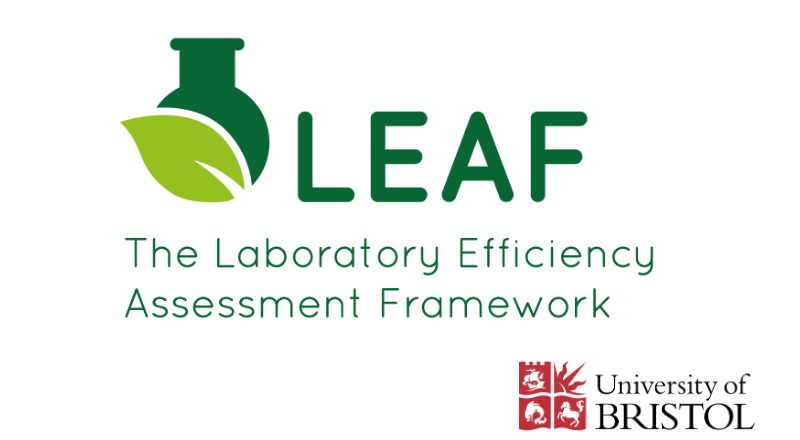Over a fifth of lab space from the University of Bristol participated in the Laboratory Efficiency Assessment Framework (LEAF) 2019, saving an estimated 92 tonnes of carbon.
The University of Bristol has a strong track record of sustainability action and became the first university to declare a 'Climate Emergency' in April. With sustainability high on the agenda, there is increasing pressure to demonstrate our commitment to reducing the university’s environmental impact and meet their 2030 carbon neutrality pledge.
This year marks the University’s move to a greener future, by setting a new ambition of 100% Green Lab Certification using the Laboratory Efficiency Assessment Framework (LEAF) in the STEMed labs. If we achieve this target we will be the first university globally to gain institutional Green Lab Certification! The University of Bristol has a long-standing commitment to sustainability and became the first university in the UK to declare a climate emergency in 2019, reaffirming our pledge to become a net-carbon neutral campus by 2030.
Labs have a significant impact on the environment- at least five times greater than that of offices. They use more resources, produce more waste and consume far greater amounts of energy and water. A significant proportion of the University’s carbon emissions comes from energy-usage, with laboratories accounting for 40% of energy consumption despite only taking up 6% of total space. Everyday lab equipment can have huge energy costs, for example, a standard -80°C freezer alone, can use as much energy as a small house (~20 kWh/day). Reducing the environmental impact of energy-intensive labs therefore plays a pivotal role in the institution's carbon strategy.
To achieve this the University of Bristol is using LEAF, a sustainability and efficiency framework for labs, developed by UCL and piloted nationally last year. 2020 is the fourth year we have run a Green Lab Certification scheme, with recent annual carbon savings of an estimated 92 tonnes of carbon. The criteria cover all aspects of sustainability in the lab with focus on waste management, procurement, business travel, research quality, chemical management and more.
The technical staff have been integral to the ambition of institution-wide certification, providing both the passion and the operational skills to ensure all our labs are involved. Green Lab Certification also requires support from researchers, particularly to gain silver or gold status.
Anna Lewis who is the Sustainable Science Manager of the Sustainability Team at the University of Bristol added:
'The University of Bristol has a strong track record in sustainability being the first in the world to declare a climate emergency, and we’re backing that up by aiming for Green Lab Certification in all of our laboratories. Currently, over a fifth of our labs hold LEAF accreditation status and I’m incredibly proud of our technical teams in leading on the coordination within our STEMed Schools. With collaboration between students, academics and technicians we’re anticipating that by the end of 2020 we’ll have institution-wide sustainable science teaching and research, which will also be a global first.'
You can find out more about the Green Lab Certification here.
ENDS
This year marks the University’s move to a greener future, by setting a new ambition of 100% Green Lab Certification using the Laboratory Efficiency Assessment Framework (LEAF) in the STEMed labs. If we achieve this target we will be the first university globally to gain institutional Green Lab Certification! The University of Bristol has a long-standing commitment to sustainability and became the first university in the UK to declare a climate emergency in 2019, reaffirming our pledge to become a net-carbon neutral campus by 2030.
Labs have a significant impact on the environment- at least five times greater than that of offices. They use more resources, produce more waste and consume far greater amounts of energy and water. A significant proportion of the University’s carbon emissions comes from energy-usage, with laboratories accounting for 40% of energy consumption despite only taking up 6% of total space. Everyday lab equipment can have huge energy costs, for example, a standard -80°C freezer alone, can use as much energy as a small house (~20 kWh/day). Reducing the environmental impact of energy-intensive labs therefore plays a pivotal role in the institution's carbon strategy.
To achieve this the University of Bristol is using LEAF, a sustainability and efficiency framework for labs, developed by UCL and piloted nationally last year. 2020 is the fourth year we have run a Green Lab Certification scheme, with recent annual carbon savings of an estimated 92 tonnes of carbon. The criteria cover all aspects of sustainability in the lab with focus on waste management, procurement, business travel, research quality, chemical management and more.
The technical staff have been integral to the ambition of institution-wide certification, providing both the passion and the operational skills to ensure all our labs are involved. Green Lab Certification also requires support from researchers, particularly to gain silver or gold status.
Anna Lewis who is the Sustainable Science Manager of the Sustainability Team at the University of Bristol added:
'The University of Bristol has a strong track record in sustainability being the first in the world to declare a climate emergency, and we’re backing that up by aiming for Green Lab Certification in all of our laboratories. Currently, over a fifth of our labs hold LEAF accreditation status and I’m incredibly proud of our technical teams in leading on the coordination within our STEMed Schools. With collaboration between students, academics and technicians we’re anticipating that by the end of 2020 we’ll have institution-wide sustainable science teaching and research, which will also be a global first.'
You can find out more about the Green Lab Certification here.
ENDS











